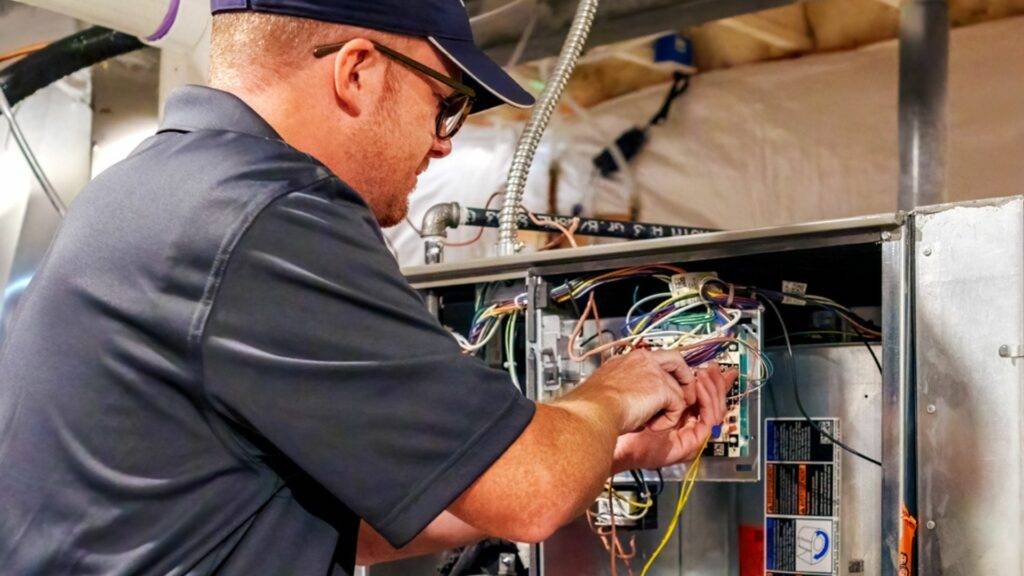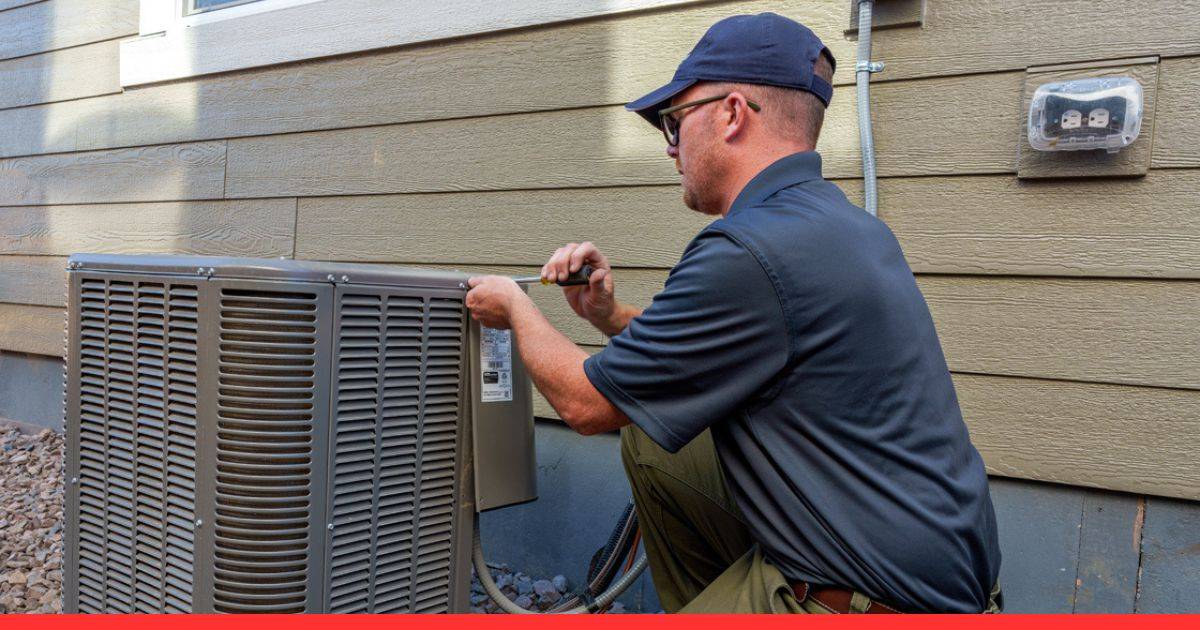How do I know if my AC needs repair?
If your air conditioner is having ongoing issues, it may be time to get it repaired. Over time, air conditioners are more likely to develop problems. Given that a typical air conditioner can last 15 to 20 years, it is often more affordable to repair it rather than replace it. With the right HVAC services, you can improve the efficiency and longevity of your air conditioner.
The Most Common Signs You Need Your Air Conditioner Repaired
With the best local AC repair services, you can quickly repair common issues with your air conditioner. The following signs are indications that you may need to call someone for AC repairs.
Higher Energy Bills
When your air conditioning unit isn’t working properly, it leads to higher energy bills. If a part breaks, it can cause the rest of the air conditioner to work harder. Often, one of the first signs that you have a faulty part is a higher energy bill.
Odd Smells
Your air conditioner isn’t supposed to make any unusual smells. Sweet odors and burning scents are the most concerning odors. If you smell a sweet scent, it means your AC is leaking refrigerant. Because breathing refrigerants can cause respiratory issues, cancer, and other health problems, it’s important to turn off your AC and call one of our HVAC technicians right away.
A burning smell can be caused by the blower motor overheating due to a clogged filter. It could be a worn-out fan belt or electrical issues. Electrical issues or an overheating blower motor can cause a fire, so these are important signs that you need to get air conditioning repaired.
If you notice a rotten smell, a rodent or animal may have gotten in the AC and died. Meanwhile, the smell of mold indicates that excess moisture in your vents and ducts has caused mold to grow.
Fluctuating Temperatures
You may need to find the best air conditioner repair in your area if the AC isn’t maintaining the correct temperature. If the AC is struggling to keep your home cool, you may have a duct leak, a mechanical problem, or a thermostat issue. Because many different problems can stop an AC from working properly, it’s important to get a professional inspection.
Weird Noises
You may need to call for AC repair services if you notice any of the following strange noises.
Squealing: If there are squealing noises coming from your compressor, it indicates high internal pressure and is an issue that needs to be fixed right away. This sound can also be caused by a loose fan belt or a problem with the fan motor.
Rattling: A banging or rattling noise may mean there are loose parts. For example, the air conditioner may have loose fan blades in the blower fan.
Clicking: It’s normal to hear a fast, clicking noise from your thermostat when your AC cycles on. If you hear a clicking noise at different times, it may be related to the capacitors or the relay switch.
Banging: This kind of noise is often due to loose parts. For example, a loose piston pin in the compressor can make a banging sound.
Buzzing: You might hear buzzing or humming noises if you have an issue with the compressor, condenser fan, or isolation feet.
Hissing: This is often from faulty components or leaky refrigerant lines. If it is the refrigerant lines, turn off your AC and call one of our HVAC technicians right away.
No Cold Air From Your Vents
If your vents are running but only blowing warm air, it may be due to various problems. Because some of these issues can be hazardous, it’s important to get professional help.
For instance, your AC will struggle to cool the air if the refrigerant is low. Recharging the refrigerant must be done by someone who has the right certification. Low refrigerant levels can also be caused by leaks, which are a safety risk for your loved ones.
Hot and Cold Zones
Your AC is supposed to keep the temperature the same in every room of your home. If there are hot and cold spots in different areas, something might be wrong with the ducts, air filters, or other components.
High Humidity
You may need to get emergency AC repair if your air conditioner isn’t doing its job. High humidity levels aren’t just uncomfortable for your family members. They can also lead to mold and mildew in your home. With air conditioner repair services, you can prevent high humidity from destroying your home.
Limited Airflow
If your AC is blowing less air out, the compressor or ducts may be the culprit. For instance, leaky ducts can reduce your airflow by letting air escape before it gets to the rooms. If all your vents are open and your air filter is clean, you should call an HVAC technician to figure out what the cause is. You don’t want your air conditioner breaking on a hot day, and 24-hour AC repair can help you quickly diagnose the source of the problem.
Moisture or Water Leaking
Leaking water can happen because of a broken or blocked condensate tube. If your AC has frozen recently, the melting ice can cause puddles of water. The most dangerous kind of liquid leak is refrigerant, so it’s a good idea to have a professional take a look at your system.
Frozen ACs
Your AC may freeze on especially hot days if it’s working more than normal. However, if it freezes because of low refrigerant levels or dirty evaporator coils, it’s worth calling for air conditioner repair services. An AC that frequently freezes may have an underlying issue that needs to be addressed.
AC Cycles On and Off Frequently
When your AC cycles on and off frequently, it may mean that your air conditioner is oversized for your home. The air conditioner keeps cycling on and off because it’s cooling your home more quickly than it was intended to.
If the air conditioner is too small for your home, the opposite issue occurs. Instead of short cycling, it will stay on for extended periods of time. On the hottest days, it may freeze because it doesn’t have a chance to turn off.
You never want an AC that is too large or small for your home size. Short cycling and staying on for extended periods are both problems for your AC’s components. Over time, these issues can lead to repair problems.
If the AC is the wrong size, you may need to get it replaced. However, it’s also important to have an HVAC technician look at your AC. If it keeps cycling on and off frequently, you could also have a problem with your thermostat, faulty compressors, or electrical problems.
What to Check If an Air Conditioner Isn’t Working?
If your conditioner isn’t working, there are a few things you can do to troubleshoot the problem. Once you’ve eliminated possible issues, you can schedule an air conditioning repair for help.
Check Your Thermostat: Ensure the thermostat light is on. If it isn’t, it may need new batteries. You can also try resetting the thermostat. Additionally, try cleaning off any dust that could be preventing the thermostat’s sensor from working effectively.
Look at the Breaker Panel: If the AC switch in the breaker panel has flipped off, try turning it back on. However, don’t try flipping the switch again if the breaker gets tripped immediately. When this happens, you need professional help.
Clean Your Air Filter: Even if you change your filter regularly, it can accumulate excess dust and dirt during the summer. To troubleshoot AC issues, clean your air filter and remove any clogs.
Check Your Maintenance Schedule: You should get your AC serviced at least once a year. If you haven’t had it serviced in over a year, call and make a maintenance appointment today.
Inspect Airflow Issues: Check your vents to see if they’re open and have air coming out. You can also check your ducts to see if there is a leak.
Unfreeze Frozen Evaporator Coils: If your AC isn’t working because the evaporator coils froze, you need to wait for them to unfreeze. This can take up to 24 hours. Don’t try to scrape the ice off yourself because you could end up harming yourself or the AC.
Look for Water and Moisture: Look around your AC unit to see if there is any water present. If there is, you should get it professionally inspected because many different issues can cause leaking.
Why It’s Important to Get Your Air Conditioner Repaired?

Your air conditioner is designed to last 15 to 20 years. Like a car, it needs routine maintenance and repairs to last as long as possible.
Lower Your Power Bill
By getting the AC repair service in Denver, you can reduce your electricity bill. Faulty parts, dirty evaporator coils, and other problems can reduce your AC’s energy efficiency. As a result, your AC has to work harder to reach the same temperature.
Extend Your System’s Longevity
When you don’t repair your system, it tends to cause additional problems. If you want your AC to last for many years, you have to take care of it properly.
Save Money on AC Replacements
Replacing an air conditioner is generally more expensive than repairing it. This is especially true if your AC is less than 10 years old. By repairing your air conditioner today, you can stave off a future replacement.
Improve Air Quality
The vents on your air conditioner filter out harmful contaminants, like dirt and dust. If you have dirty vents and your AC isn’t working right, it can worsen the air quality in your home.
Keep Your Home Comfortable
The most important reason to get emergency AC repair is to keep your home as comfortable as possible. Summers can sometimes be uncomfortably hot in Colorado, and you don’t want to sweat in the heat. By calling for repair services, you can help your family cool off.
When Do I Need to Replace My AC?
Even the best air conditioners will eventually need to be replaced. When an HVAC technician comes to inspect your AC problem, they can discuss whether it is a better idea to repair or replace your AC.
As a general rule, it makes sense to replace your AC if your AC is already 10 years old and the repairs will cost half the price of a new air conditioner installation. You may also want to consider a replacement if your air conditioner seems to be breaking all the time.
Will My Warranty Cover the Repairs?
Each warranty is different, so it’s important to read the policy to see what is covered and for how long. Many warranties also have specific requirements, like getting routine maintenance each year.
However, there are many circumstances where your warranty will cover the cost of repairs. If you are unsure, you can always call your warranty company to ask.
Protect Your Air Conditioner From Additional Damage
With the best air conditioner repair, you can prevent further damage. Some AC issues are also potentially dangerous, so you need to get them repaired quickly. Once you repair your air conditioner, you can enjoy having a cooler, more comfortable home.
